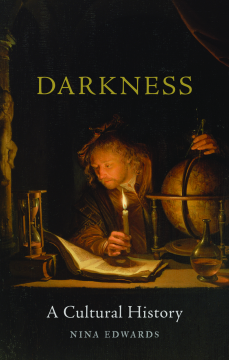
Additional Information
Book Details
Abstract
Darkness divides and enlivens opinion. Some are afraid of the dark, or at least prefer to avoid it, and there are many who dislike what it appears to stand for. Others are drawn to this strange domain, delighting in its uncertainties, lured by all the associations of folklore and legend, by the call of the mysterious and of the unknown. The history of our attitudes toward darkness—toward what we cannot quite make out, in all its physical and metaphorical manifestations—challenges the very notion of a world that we can fully comprehend.
In this book, Nina Edwards explores darkness as both a physical feature and cultural image, through themes of sight, blindness, consciousness, dreams, fear of the dark, night blindness, and the in-between states of dusk or fog, twilight and dawn, those points or periods of obscuration and clarification. Taking us across the ages, from the dungeons of Gothic novels to the concrete bunkers of Nordic Noir TV shows, Edwards interrogates the full sweep of humanity’s attempts to harness and suppress the dark first through our ability to control fire and, later, illuminate the world with electricity. She explores how the idea of darkness pervades art, literature, religion, and our everyday language. Ultimately, Edwards reveals how darkness, whether a shifting concept or palpable physical presence, has fed our imaginations.
"Edwards, who has previously submitted weeds, buttons, and offal to this [cultural history] process, brings a huge range of knowledge, enthusiasm, and sensitivity to the subject. . . . Edwards presents herself openly as an advocate of the dark 'taking its part against the tide of opinion that promotes the light,' but she maintains, sometimes very deftly, a balance and a breadth that are refreshing."
— Sara Maitland, Tablet
"It is apt that such a mesmerizing image should accompany the opening chapter of Edwards’s beguiling book, which gallantly aims to subvert common views of darkness, both physical and metaphorical. . . . For the most part, Edwards’s approach is considered and engaging as she explores the curious paradoxes and possibilities of ethereal half-shadows and 'umbral blackness.' . . . Marking Edwards’s latest work to embrace the neglected and the obscure (previous offerings include weeds, buttons, and Offal: A Global History), Darkness leaves the reader floating, too—but full of conviction that truth and beauty can still exist, to quote Edward Lear, 'when awful darkness and silence reign.'"
— Spectator
“As subjects go, darkness would seem a little slippery, but in Darkness: A Cultural History, English historian Edwards, a specialist in poetic analyses of the commonplace (the significance of buttons, the history of offal, and so on), grasps it with a sure and practiced mind, sifting through perceptions for an array of definitions that boil down to one idea: possibility. . . . To Edwards, darkness is a thing of richness, universally accessible and transformative, and her passion for the intimacy it allows—a passion buoyed by fluent prose and deep research—expands our understanding, not only of her subject but of its role in our hearts and history.”
— Australian
"The power of encountering life through a dark or dimly lit lens is very much on trend and Edwards’s Darkness: A Cultural History fits right in, offering a broad, sweeping narrative which ventures into the worlds of history, anthropology, and science. . . . It is a beautifully produced work, in hardback, with color plates and illustrations that reflect the importance given by the author to darkness in art and poetry. It is the sort of book that makes you want to hold it, caress the cover, and turn the pages gently."
— Methodist Recorder
“A philosophical undercurrent runs through Edwards’s introduction to this compendious survey of darkness, but the scope and energy are what immediately impress. . . . The book is very well written, reminiscent of the work of Alexandra Harris and recognizably a descendant of Sir James Frazer. . . . No kind of darkness is excluded from this cultural history—interior, exterior, metaphorical, racial, psychological, even abstract (black humor)—and, inevitably, there is much that is fascinating. . . . There is no denying the thoroughness of the author’s researches or her gift for lively—dare one say illuminating—synthesis.”
— Country Life
“So many dark matters are brought to light in Edwards’s study. . . . Edwards writes with flair about art’s capacity for capturing the contrariness of the dark. She links the chiaroscuro of Caravaggio or Rembrandt to the kind of heightened tension generated by film noir. . . . Edwards’s prose is melodic and erudite.”
— Times Literary Supplement
Nina Edwards is the author of On the Button: The Significance of an Ordinary Item; Dressed for War: Uniform, Civilian Clothing and Trappings, 1914–1918; Weeds; and Offal: A Global History, the last two also published by Reaktion Books. She lives in London.
Table of Contents
| Section Title | Page | Action | Price |
|---|---|---|---|
| Cover | Cover | ||
| Title Page | 3 | ||
| Imprint Page | 4 | ||
| Contents | 5 | ||
| Introduction | 7 | ||
| One: Earth and Fire: How Darkness Came About | 29 | ||
| Two: The Ancients and How Darkness Brought About Everything Else | 47 | ||
| Three: The Art of Darkness | 67 | ||
| Four: Darkly Entertaining | 109 | ||
| Five: Photography, Electricity and the Moving Image | 145 | ||
| Six: The Psychology of Darkness and Sleep | 185 | ||
| Seven: Dark Fashion | 215 | ||
| Eight: The Darkness Shall Be the Light | 235 | ||
| Conclusion | 251 | ||
| References | 257 | ||
| Bibliography | 277 | ||
| Acknowledgements | 285 | ||
| Photo Acknowledgements | 287 | ||
| Index | 289 |
